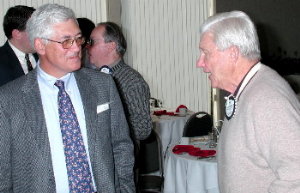|
|

Dr. Al Einstein (L) talks with Ted Szatrowski after Friday’s presentation.
|
Dr. Albert B. Einstein, Jr., Executive Director of Seattle's Swedish Cancer Institute, posed the question for this week's program in his report of progress being made in the War on Cancer.
"On September 11, we all were consumed with feelings of shock, fear, grief and anger when the events in New York, Washington, and Pennsylvania unfolded. Cancer patients and their families have exactly the same emotions. It's simply the normal human response," related Dr. Einstein.
He said he would give information about the hope we should have, a lesson in biology, followed by a warning. "The good news is the new understanding that research scientists have made in their quest to conquer cancer. We now know that it is a multiple disease and cause, requiring multiple treatment strategies. There is no single magic bullet when it comes to finding and treating cancer," the Doctor observed.
The biology course began with a slide showing a healthy cell. "The nucleus is where the trouble lies. Contained in the nucleus are chromosomes and DNA, in sequence, which provides growth. The gene sequence on the DNA strands determines color of hair, eyes, skin, and function. There are functional genes and regulator genes."
Dr. Einstein said that research reveals "genetic damage which alters the natural growth process. It happens every second, where normal cell growth is altered – where the rate of division and the rate of cell death, which is natural – -is altered."
Cancer results from the alteration of genes involved in cell growth and cell death. "When this happens, the cancer invades normal tissue, forming new tumors. All of this can be inherited, and our studies show that a lot of cancers will occur."
So, what causes genetic change? The Doctor says "10% of the change is inherited, 40% is spontaneous. Some of the treatments may alter the change, such as radiation and the chemicals, for instance, in tobacco are known cancer causers. Viruses and eiet can also bring about genetic change."
"We now know why this alteration occurs, which gives us a whole new opportunity to treat the disease," exulted Dr. Einstein. "By using a targeted drug therapy, we can design drugs to reverse genetic change. One such drug is Gleevec, a new drug just approved this year by the FDA, which is showing promising results in combating leukemia. It is taken in pill form, is non-toxic, and well tolerated. Unfortunately, it is not yet covered by insurers or Medicare."
Gleevec is just one example of what's occurring on the cancer research front. "There are over 350 new drugs in the pipeline, each attacking a part of the multiple characteristics of cancer."
"However, there is bad news, too. Here in the Seattle area, we are plagued with rising costs and inadequate reimbursements because we were caught in a Federal freeze of payments several years ago. Today, hospitals are losing money, there's minimal capital investment, physicians are moving and leaving their practices, a shortage of nursing and tech personnel is becoming critical, and philanthropic funds are more scarce. We all want the best, but the question is 'Who will pay?'"
Swedish Cancer Institute enrolls 3,500 new cancer patients each year, with 130 physicians dedicated to their treatment. A new outpatient facility will open soon, to continue to give excellent coverage, despite the gloomy reimbursement news.
When asked what can we do to level the rates of reimbursement, Dr. Einstein responded, "The situation will change only when enough pressure is brought to bear on Congress and the Federal Health Care system. A huge lobbying effort must be raised to effect changes in the Medicare reimbursement freeze now in effect."
Dr. Einstein, a member of Seattle #4 Rotary, noted that his son Will is an active member of the BBRC. For his enlightening talk, he was presented with a certificate showing that 600 pounds of food has been donated in his name to Rotary First Harvest.
Thanks to Bob Vallat for his introduction.
|